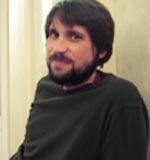 Part of Fordham’s rigorous PhD program is its mandatory Teaching Tutorial. This class uses one-on-one training with a member of Fordham History’s professoriate to give PhD candidates valuable pedagogical training and classroom experience. The tutorial transitions PhDs from their first two years of coursework into their upcoming teaching assignments mandated by the PhD program’s funding package. We caught up with Michael Sanders, a PhD candidate who is finishing his second year at Fordham and recently completed his tutorial with Dr. Héctor Linda-Fuentes, to get his perspective on the experience.
Part of Fordham’s rigorous PhD program is its mandatory Teaching Tutorial. This class uses one-on-one training with a member of Fordham History’s professoriate to give PhD candidates valuable pedagogical training and classroom experience. The tutorial transitions PhDs from their first two years of coursework into their upcoming teaching assignments mandated by the PhD program’s funding package. We caught up with Michael Sanders, a PhD candidate who is finishing his second year at Fordham and recently completed his tutorial with Dr. Héctor Linda-Fuentes, to get his perspective on the experience.
Tag Archives: Early Modern History
Fordham PhDs and Educating Future Educators
Comments Off on Fordham PhDs and Educating Future Educators
Filed under Courses, Grad Student News, Teaching
Fordham Professors in the News
 Dr. Saul Cornell, the Paul and Diane Guenther Chair in American History, the author of A Well-Regulated Militia: The Founding Fathers and the Origins of Gun Control in America, and a recognized authority on the Second Amendment, has recently published two online articles about the gun debate: “Gun Anarchy and the Unfree State, the Real History of the Second Amendment” in The Baffler (October 3), and in Salon (October 22), “Five Types of Gun Laws the Founding Fathers Loved: Were muskets in 1777 better regulated than assault rifles in 2017?”
Dr. Saul Cornell, the Paul and Diane Guenther Chair in American History, the author of A Well-Regulated Militia: The Founding Fathers and the Origins of Gun Control in America, and a recognized authority on the Second Amendment, has recently published two online articles about the gun debate: “Gun Anarchy and the Unfree State, the Real History of the Second Amendment” in The Baffler (October 3), and in Salon (October 22), “Five Types of Gun Laws the Founding Fathers Loved: Were muskets in 1777 better regulated than assault rifles in 2017?”
 Dr. Asif Siddiqi’s highly regarded book, Challenge to Apollo: The Soviet Union and the Space Race, 1945-1974, was quoted in a recent New Yorker article. The article, “Remembering Laika, Space Dog and Soviet Hero” (November 3, 2017) quoted Dr. Siddiqi’s description of the stringent requirements that Soviets followed in choosing dogs for the space mission.
Dr. Asif Siddiqi’s highly regarded book, Challenge to Apollo: The Soviet Union and the Space Race, 1945-1974, was quoted in a recent New Yorker article. The article, “Remembering Laika, Space Dog and Soviet Hero” (November 3, 2017) quoted Dr. Siddiqi’s description of the stringent requirements that Soviets followed in choosing dogs for the space mission.
 Dr. Steven Stoll’s forthcoming new book, Ramp Hallow: The Ordeal of Appalachia (Hill and Wang) received an in-depth review in Washington Monthly, published jointly with ProPublica (October 30). As described by the reviewer, Stoll, “has set out to tell the story of how the people of a sprawling region of our country—one of its most physically captivating and ecological bountiful—went from enjoying a modest by self-sufficient existence as small- scale agrarians for much of the eighteen and nineteenth centuries to a dreary dependency on the indulgence of coal barons or the alms of government.” Dr. Stoll will discuss his new book at The New School on November 13.
Dr. Steven Stoll’s forthcoming new book, Ramp Hallow: The Ordeal of Appalachia (Hill and Wang) received an in-depth review in Washington Monthly, published jointly with ProPublica (October 30). As described by the reviewer, Stoll, “has set out to tell the story of how the people of a sprawling region of our country—one of its most physically captivating and ecological bountiful—went from enjoying a modest by self-sufficient existence as small- scale agrarians for much of the eighteen and nineteenth centuries to a dreary dependency on the indulgence of coal barons or the alms of government.” Dr. Stoll will discuss his new book at The New School on November 13.
Comments Off on Fordham Professors in the News
Filed under Essays in History, Faculty News, Publications, This week in Fordham History
PhD Candidate Glauco Schettini wins ASMI Postgraduate Essay Prize
 Congratulation to Glauco Schettini for receiving the Association for the Study of Modern Italy Postgraduate Essay Prize. The ASMI is a UK-based organization founded in 1982 by the Oxford historian Christopher Seton-Watson, and promotes research into Italian history, society, culture, and politics from the eighteenth to twenty-first century.
Congratulation to Glauco Schettini for receiving the Association for the Study of Modern Italy Postgraduate Essay Prize. The ASMI is a UK-based organization founded in 1982 by the Oxford historian Christopher Seton-Watson, and promotes research into Italian history, society, culture, and politics from the eighteenth to twenty-first century.
Glauco’s essay, “Building the Third Rome: The New District in Prati di Castello, 1870-1895,” examines the creation of a new neighborhood in Prati di Castello (the area surrounding the Vatican) after Rome’s annexation to the Kingdom of Italy in 1870. Continue reading
Comments Off on PhD Candidate Glauco Schettini wins ASMI Postgraduate Essay Prize
Filed under Essays in History, Grad Student News, Student Awards, Uncategorized
New Fellow, Awards, and Lectures in Jewish Studies
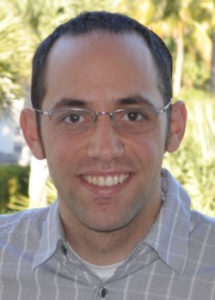 Fordham University is excited to welcome Dr. Marc Herman as the first joint Rabin-Shvidler Post-doctoral Fellow in Jewish Studies at Fordham and Columbia. Dr. Herman received his PhD in 2016 from the University of Pennsylvania, where he wrote his dissertation on rabbinic jurisprudence in the medieval Islamic world. His presence will add new dimensions to the teaching of the medieval period in Jewish history, to comparative legal studies, and the intersection of Jewish life and Islamic jurisprudence. At Fordham he teaches the courses “Ancient and Medieval Jewish History” and “Islam and Judaism: Law and Religion.”
Fordham University is excited to welcome Dr. Marc Herman as the first joint Rabin-Shvidler Post-doctoral Fellow in Jewish Studies at Fordham and Columbia. Dr. Herman received his PhD in 2016 from the University of Pennsylvania, where he wrote his dissertation on rabbinic jurisprudence in the medieval Islamic world. His presence will add new dimensions to the teaching of the medieval period in Jewish history, to comparative legal studies, and the intersection of Jewish life and Islamic jurisprudence. At Fordham he teaches the courses “Ancient and Medieval Jewish History” and “Islam and Judaism: Law and Religion.”
The fellowship and awards are made possible by the Stanley A. and Barbara
B. Rabin Postdoctoral Fellowship Fund at Columbia University and the Eugene Shvidler Gift Fund at Fordham University. Continue reading
Comments Off on New Fellow, Awards, and Lectures in Jewish Studies
Filed under Department Events, Events, Magda Teter, New Course, Teaching
Timothy Brook Delivers O’Connell Lecture on Capitalism and the Law of the Sea in 17th Century Java
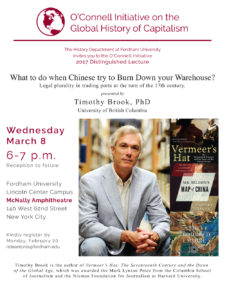 Fordham University was honored to host Professor Timothy Brook this last Wednesday in the McNally Auditorium as part of the O’Connell Initiative on the Global History of Capitalism. Prof. Brook has spent his prolific career studying cultural and social history in Southeast Asia. From the Ming Dynasty in 14th to 17th century China to the Japanese occupation of China during WWII, Dr. Brook has authored numerous monographs, including the acclaimed Vermeer’s Hat: The Seventeenth Century and the Dawn of the Global World (London: Profile Books, 2009) and, most recently, The Troubled Empire: China in the Yuan and Ming Dynasties (Cambridge, MA: Belknap Press of Harvard University Press, 2010).
Fordham University was honored to host Professor Timothy Brook this last Wednesday in the McNally Auditorium as part of the O’Connell Initiative on the Global History of Capitalism. Prof. Brook has spent his prolific career studying cultural and social history in Southeast Asia. From the Ming Dynasty in 14th to 17th century China to the Japanese occupation of China during WWII, Dr. Brook has authored numerous monographs, including the acclaimed Vermeer’s Hat: The Seventeenth Century and the Dawn of the Global World (London: Profile Books, 2009) and, most recently, The Troubled Empire: China in the Yuan and Ming Dynasties (Cambridge, MA: Belknap Press of Harvard University Press, 2010).
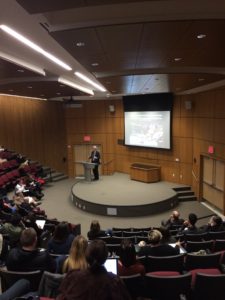 Prof. Brook’s presentation, an ongoing research project titled “What to do when Chinese Try to Burn Down your Warehouse: Legal Plurality in Trading Ports at the Turn of the 17th Century,” was a captivating collection of stories and theories regarding the burgeoning role of capitalism in the Southeast Asian port city of Bantam. Eyebrow-raising title aside, Brook’s pithy and poignant ideas on capitalism gave the gathered crowd much to discuss in the following Q&A. During both the presentation and resulting discussion, Brook maintained that, “capitalism may have emerged in Europe, but only because of Europe’s engagement with the rest of the world.” Brook elaborated his examination of the legal troubles that plagued the Europeans’ imperialist endeavors through four stories culled from the diary of the early 17th century English trader Edmund Scott. Such legal troubles may have hampered immediate European imperialism in each specific case, but they may have also formed a framework by which the European powers could then apply when trading with other plundered nations. Such legal cases after all gave rise to Huig de Groot’s Mare Liberum and the ensuing legal debate on the law of the seas.
Prof. Brook’s presentation, an ongoing research project titled “What to do when Chinese Try to Burn Down your Warehouse: Legal Plurality in Trading Ports at the Turn of the 17th Century,” was a captivating collection of stories and theories regarding the burgeoning role of capitalism in the Southeast Asian port city of Bantam. Eyebrow-raising title aside, Brook’s pithy and poignant ideas on capitalism gave the gathered crowd much to discuss in the following Q&A. During both the presentation and resulting discussion, Brook maintained that, “capitalism may have emerged in Europe, but only because of Europe’s engagement with the rest of the world.” Brook elaborated his examination of the legal troubles that plagued the Europeans’ imperialist endeavors through four stories culled from the diary of the early 17th century English trader Edmund Scott. Such legal troubles may have hampered immediate European imperialism in each specific case, but they may have also formed a framework by which the European powers could then apply when trading with other plundered nations. Such legal cases after all gave rise to Huig de Groot’s Mare Liberum and the ensuing legal debate on the law of the seas.
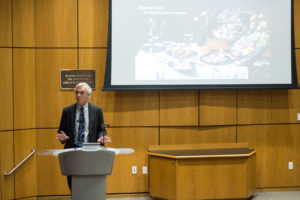 The History Department would like to extend its sincerest thanks to Professor Timothy Brook and the O’Connell Initiative for taking the time to present his insightful and illuminating research.
The History Department would like to extend its sincerest thanks to Professor Timothy Brook and the O’Connell Initiative for taking the time to present his insightful and illuminating research.
For more on Professor Brook’s talk, see here.
Comments Off on Timothy Brook Delivers O’Connell Lecture on Capitalism and the Law of the Sea in 17th Century Java
Filed under Department Events, Events, O'Connell Initiative
Art Historian Speaks on the Place of Islamic Artworks in Christian Spain
During a visit to New York to attend the College Art Association conference (CAA) Professor Antonio Urquízar Herrera from the Universidad Nacional de Educacion a Distancia in Madrid stopped by Fordham’s Rose Hill campus to speak to a group of faculty and graduate students. As the group enjoyed lunch courtesy of the History Department Professor Urquízar-Herrera discussed his forthcoming book Admiration and Awe: Morisco Buildings and Identity Negotiations in Early Modern Spanish Historiography, which examines how Spanish Christian historians of the sixteenth century processed the presence of Islamic architecture at the heart of their cities. Particularly in Andalusia, where the last Muslim controlled towns were conquered by Christian powers in 1492, writers who wanted to describe the glory of their cities had to contend with monumental works of Islamic architecture. How, if at all, did they acknowledge the origins of these buildings, so patently different from their own Gothic cathedrals and palaces? 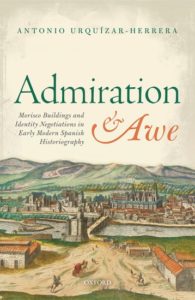 Following a lively talk, the visiting art historian was generous enough to discuss his manuscripts, religious appropriation, and ideas concerning race and identity in Early Modern Spain with several graduate students.
Following a lively talk, the visiting art historian was generous enough to discuss his manuscripts, religious appropriation, and ideas concerning race and identity in Early Modern Spain with several graduate students.
The department, and especially the students who stuck around for the discussion, would like to thank Professor Herrera for his illuminating presentation. “Admiration and awe” captures the feelings of the Fordham audience quite nicely!
Comments Off on Art Historian Speaks on the Place of Islamic Artworks in Christian Spain
Filed under Department Events, Events
What do Historians do in the Summertime? Postcard from Scotland.
Many people unfamiliar with the world of scholarship assume that the summer break between the Spring and Fall semesters is a time for holidays and relaxation. But for historians, the respite from teaching and classes means that summer is often the time when research, writing, conference going, and travel to archives, kicks into high gear.
Our first postcard this summer comes from PhD student Salvatore Cipriano. Supported by a Fordham GSAS Research Support Grant and a Graduate Student Association Professional Development Grant, Sal has been in Scotland since June 1.
Comments Off on What do Historians do in the Summertime? Postcard from Scotland.
Filed under Grad Student News
New Directions in Early Modern and Modern History: The 2015 Fordham Graduate Colloquium Conference, May 8 4PM
The History Department is pleased to announce the schedule for the 2015 Graduate Colloquium Conference “New Directions in Early Modern and Modern History”. The conference will take place on Friday May 8 at 4PM in Walsh Library 040.Presentations cover evenly almost the whole period from the sixteenth to the twentieth centuries, with presenters addressing topics as diverse as royal succession and government in Tudor England, torture and public disorder in Colonial America, and mass consumption, labor justice, and education in the modern US. Read on for the conference schedule and paper abstracts…
Comments Off on New Directions in Early Modern and Modern History: The 2015 Fordham Graduate Colloquium Conference, May 8 4PM
Filed under Department Events
Tudor Historian Offers Perspective on Scottish Independence (Video Link)
When ABC News was looking for an expert to provide historial background to the momentous vote for Scottish Independence this past September, they turned to Fordham historian Chris Maginn. Chris gives us some background:
though I am a Tudor specialist by training, and am interested in the history of state formation, I try to keep abreast of contemporary politics in Britain in Ireland. While on leave in Ireland I was interviewed by America Magazine about the importance of the President of Ireland’s state visit to England: http://americamagazine.org/issue/higgins-visit-suggests-sea-change-anglo-irish-relations. So, the afternoon before the referendum I went up to ABC’s studio on 66th street and did a television interview; the following morning, in the wake of the election result, I was asked to do radio interviews on some of ABC’s national affiliates.
And here’s the video of the interview with Chris on ABC News (scroll to 7:40 to hear Chris Maginn’s comments)
Comments Off on Tudor Historian Offers Perspective on Scottish Independence (Video Link)
Filed under Faculty News
Fordham Student Thanked in New Book on Anne Boleyn
 It isn’t every day that an undergraduate student is acknowledged in a widely-read work of historical scholarship. That’s why the History Department was excited to learn that a Fordham undergraduate, Marlessa Stivala, was thanked for her input in Susan Bordo’s new book, The Creation of Anne Boleyn (Houghton Mifflin Harcourt, 2013). Continue reading
It isn’t every day that an undergraduate student is acknowledged in a widely-read work of historical scholarship. That’s why the History Department was excited to learn that a Fordham undergraduate, Marlessa Stivala, was thanked for her input in Susan Bordo’s new book, The Creation of Anne Boleyn (Houghton Mifflin Harcourt, 2013). Continue reading
Comments Off on Fordham Student Thanked in New Book on Anne Boleyn
Filed under Undergrad News

